Ottawa County's prospective health officer has no experience. Here's why that could be a problem
OTTAWA COUNTY — The saga over who will lead the Ottawa County Department of Public Health in 2023 continues to unfold, as a new group of county commissioners aims to install a health officer who aligns with their beliefs and values.
The Ottawa County Board of Commissioners appointed longtime health department employee Adeline Hambley to be the next administrative health officer in December after former officer Lisa Stefanovsky announced her retirement in August.
More:Ottawa County Board abruptly fires administrator, hires former GOP candidate John Gibbs
More:Ottawa County board picks internal candidate as new health officer
But the new board, which took office in January, is controlled by far-right political group Ottawa Impact, which vowed on the campaign trail last summer to prevent any future mask mandates in the county to defend “the constitutionally protected rights of parents to make health and education decisions for their own children.”
The group made good on that promise during its first meeting Jan. 3, where eight new Ottawa Impact-backed commissioners and one Ottawa Impact-endorsed incumbent made a series of sudden, sweeping changes, including firing the county administrator, firing its longtime corporate legal counsel, changing the county’s inclusive motto and putting forward its preferred choice for health officer: Nathaniel Kelly.
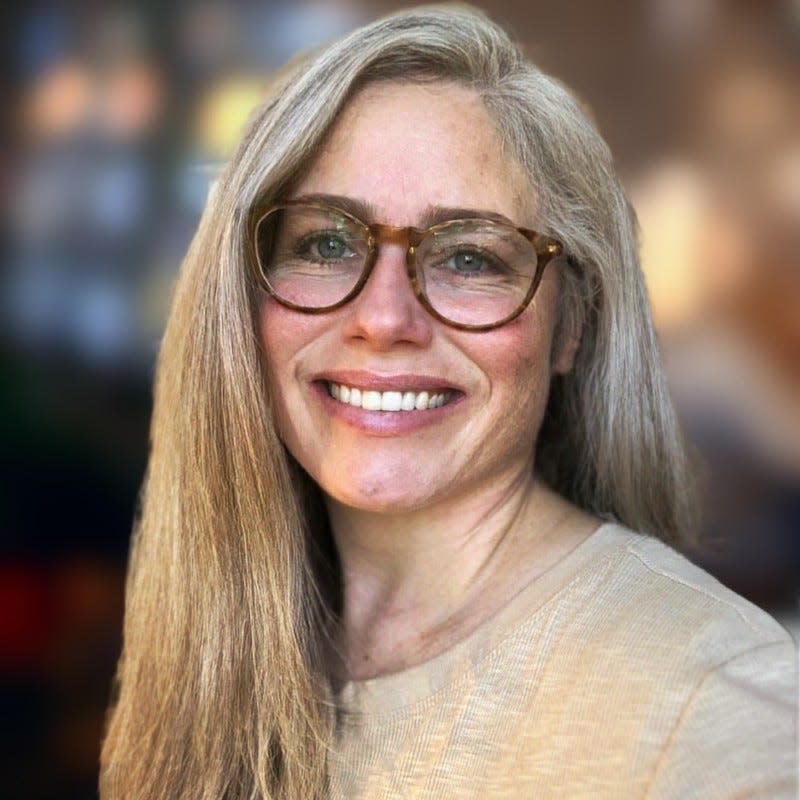
Hambley has worked in the department for nearly 19 years, serving as environmental health manager since 2011. In that role, she oversaw the food inspection program, sustainability centers and well and septic programs. She holds a bachelor's degree in biology and a master's in business administration, both from Grand Valley State University.
Kelly is a health and safety manager at a Grand Rapids-area HVAC company. He has no previous work history in public health and said he'd recommend kits for individuals infected by COVID-19 with vitamins, ivermectin and neti pots, but not masking or social distancing.
“No social distancing would be suggested since it has no basis in any proven science,” Kelly said during an event in 2022. “No mass testing for asymptomatic individuals; asymptomatic individuals do not transmit disease.”
The new @miOttawa health officer Nathaniel Kelly explains how he'd handle Covid: send households a kit w/ vitamins & minerals, ivermectin & neti pot. Ask all businesses to upgrade their HVAC. No masking of any type. No social distancing. No mass testing asymptomatic individuals. pic.twitter.com/f5mRulPK2D
— Extreme Michigan (@ExtremeMichigan) January 4, 2023
Over the past month, residents have asked: How much authority does the county board have when it comes to matters of public health? What is a health officer? Why is the role getting so much attention? And, chiefly, why does it matter?
What is a health officer?
Over the past three years, health officers have seen intense and unexpected attention, as the COVID-19 pandemic ravaged the globe and federal, state and county health authorities grappled with emergency orders to contain the spread.
But health officers do far more than virus mitigation. The state legislature enacted the Michigan Public Health Code in 1978, granting broad and flexible authority to public health departments to protect the public from numerous health threats.
Norm Hess is the executive director of the Michigan Association for Local Public Health, or MALPH. He said Michigan’s Public Health Code authorizes state and local public health officers to protect the public against environmental and other hazards by issuing imminent danger orders, or orders to eliminate nuisances, unsanitary conditions and sources of illness.

Michigan has 45 health departments that service the state’s 83 counties. All of those departments, Hess said, are required by state law to provide specific services outlined in public health code.
They include:
Infectious disease control
Sexually transmitted disease control and prevention
Immunization
Hearing screening and vision services
Public water supply/private ground water supply
Onsite sewage management
Food protection
MALPH's members are health officers, responsible for running their local departments. It provides training programs and serves as an advocate to legislators, as well as a liaison with state agencies like the Michigan Department of Health and Human Services, the Michigan Department of Environment, Great Lakes, and Energy and the Michigan Department of Agriculture and Rural Development.
Hess stressed that, despite the intense interest shown in local health departments during the onset of COVID-19, the concept of public health is much more vast than a single virus.
“We’re trying to help educate the public now what the role of public health is,” Hess said. “There are so many other aspects to public health than what we’ve seen the past few years.”

Denise Chrysler, the director of the mid-states region for the Network for Public Health Law, said it’s important for citizens to understand the totality of what a health officer is.
“I mean, we’re not just talking about COVID, we’re talking about sanitation, we’re talking about water supply, we’re talking about environmental hazards of all types — and we’re talking about routine services,” she said. “And when I see someone talking about horse de-wormers instead of immunizations, I get a little worried about the public’s health.”
Why does it matter who fills the role?
“For one thing, it seems to be a vast misunderstanding that health officers are essentially CEOs or bureaucrats,” said Ingham County Health Officer Linda Vail. “That’s true to some extent, in terms of managing large staffs and multi-million dollar budgets.”
The similarities to corporate America, however, end there, Vail said.
“To be a health officer, you have to have certain credentials. You have to have a master of public health. You have to have full-time administrative experience in public health. So there actually is a body of science and a body of knowledge that they expect you to have.”

Kelly has defended his credentials, arguing his experience with the Occupational Safety and Health Administration during his military career inspired him to continue his education through the online for-profit college Columbia Southern University. Kelly has two degrees from the college, including a master of public health in 2020 and a master in occupational health in 2018.
“As to the online college aspect, I am an autodidact and was functioning in the course of my professional duties while garnering the certifications and degrees needed to show basic competency in my chosen field,” Kelly wrote in a letter to Ottawa County Commissioner Gretchen Cosby.
Cosby, an Ottawa Impact-backed member of the board, submitted Kelly’s statement during a Health and Human Services Committee meeting on Tuesday, Jan. 31, that saw several tense exchanges on how Cosby came to review Kelly’s application for the health officer position when the job was no longer posted.
At the same meeting, Commissioner Jacob Bonnema told Hambley he wanted to see the creation of a panel where commissioners and other community stakeholders would be able to give input before future orders are issued.
“It’s currently set up that when there’s a pandemic or something of that nature — that the decisions for mandates resides squarely on your shoulders as the health officer. And that’s a huge responsibility — it affects a lot of people,” Bonnema said. “Any further discussion on that topic — is that something you’d like to pursue?”
Hambley responded, “I think it’s always good to have more people weighing in. … I certainly think that would be valuable.”
More:Ottawa commissioners spar over health officer choice during committee meeting
The health department hasn't publicly broached the topic of any future COVID-19 orders or mandates since the county’s pre-K-6 mask mandate expired more than a year ago.
“COVID is still with us,” Hess said. “But we’ve moved into a different phase of managing it.”
According to Hess, MALPH is preparing a report, scheduled to be released in April, that will analyze how Michigan’s health departments responded to the pandemic, with input from various industries, including business, education and restaurants, to learn from the response effort and better prepare for future health threats.
More:Court of Appeals upholds Ottawa County health officer's right to issue mask mandate
“You were watching science in action in real time and science is an iterative process,” Vail said. “We did this and that worked, so we’ll build off that. Or that didn’t work and we need to rapidly move in another direction. And I don’t think that’s over. It’s been three years and we’re still learning about this virus.”
Who decides on health orders?
Public health officers ultimately have the final say on emergency health-related orders as part of their duty to uphold Michigan’s laws governing public health.
In fact, an appeals court in December 2022 upheld a lower court’s decision after Ottawa County Board Chair and Ottawa Impact founder Joe Moss and other parents sued the county, the previous board and Stefanovsky for her school mask mandate in 2021.
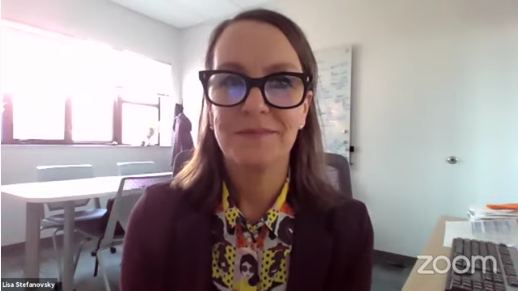
Both courts found that Stefanovsky acted legally and appropriately when she issued the order during the height of the COVID-19 pandemic.
In the lawsuit, Moss claimed Stefanovsky overstepped her authority and should've sought approval from the board of commissioners before issuing the mask order.
At last week’s meeting, Moss told Hambley, “I just want to be clear that the Ottawa County Board of Commissioners has a very firm stance on mandates, and that there will not be mandates in Ottawa County. … (The) Ottawa County local government health department will not overstep parental rights. I just wanted to make that exceedingly clear.”
“Ultimately — the decision, because the liability lies on the health officer role, the decision lies on the health officer role,” Hambley said.
Health experts are concerned about the board’s clear aim of taking more control.
“Is the panel a way of educating the board? To help educate the community? Or is it a way to move some of the health officer’s power to the county?” said Carrie Waggoner, deputy director under Chrysler.
“That’s why the powers of health officers exists — is to issue those sorts of health orders when conditions like that come up,” Waggoner said. “One of the tensions that exists is the county commissioners appoint and kind of hold the power of the pursestrings to appropriate the funding, but the health officer is the one responsible for making the determination, looking at the facts, looking at the science, looking at the community, and then making the determination if, under the law, they need to make an order.

“And that lies with the health officer, not with the county.”
Chrysler said it’s concerning the board seems so singularly focused on COVID-19 and mask or vaccine mandates, when public health means so much more.
“The one thing the board of commissioners may not be considering is the responsibilities, the duties, the services that are tied to the local funding of the health department because millions come from the legislature that is allocated to the state and then to the local departments,” she said.
More:Did the majority of Ottawa County support Ottawa Impact at the polls? The data says no
More:Christian nationalism is gripping the nation — has it arrived in Ottawa County?
For example, family planning.
The Ottawa County Health Department currently receives federal Title X funding (as a sub-recipient of MDHHS) to provide services related to contraception and family planning.

Hess said the county’s three sites — Holland, Hudsonville and Grand Haven — must provide a broad range of medically approved family planning services, which includes all FDA-approved contraceptive products and natural family planning methods.
It’s unclear what Ottawa Impact’s plans are for sexual health education, but Bonnema and others have already expressed their disapproval of the county’s website previously providing links to Bedsider.org and PowerToDecide.org, which they said were "activist" and contained inappropriate content, such as tools to find an abortion service provider.
“I am not sure what would be the ramifications of the commission deciding to suspend these services without going through proper channels to end their contract with the state,” Hess said.
Chrysler said the conversations currently happening in Ottawa County are unprecedented in her 40-year career.
“I’ve practiced public health law since 1983. ... I’ve never seen this level of micromanagement and blatant disregard of the public health code and what a health department does,” she said.
Vail, the Ingham County health officer, said the board’s attempt to justify Kelly’s appointment — citing the presence of other health experts within the department to prop him up — is the wrong way to go about it.
“Being a health officer isn’t like running any old company and saying, ‘OK, are we making enough of this?’ or ‘Are we selling enough of that to keep profit margins up?' It’s not just, ‘Let’s go in and run a department I know nothing about because I’m good at managing, I’m good at leading people and I understand budgets.’ That is not enough. It is literally, ‘How are we going to protect the health and the welfare of this community?’” she said.
Vail said she's particularly concerned about Kelly’s lack of experience working in public health.
“There are a lot of people out there with a master's in public health,” she said. “My son has a degree in theater. He’s working at Lowe’s. Your degree doesn’t mean you have experience in what that field is. And to be a public health officer, you have to have both. You have to have that degree and that appropriate experience.”
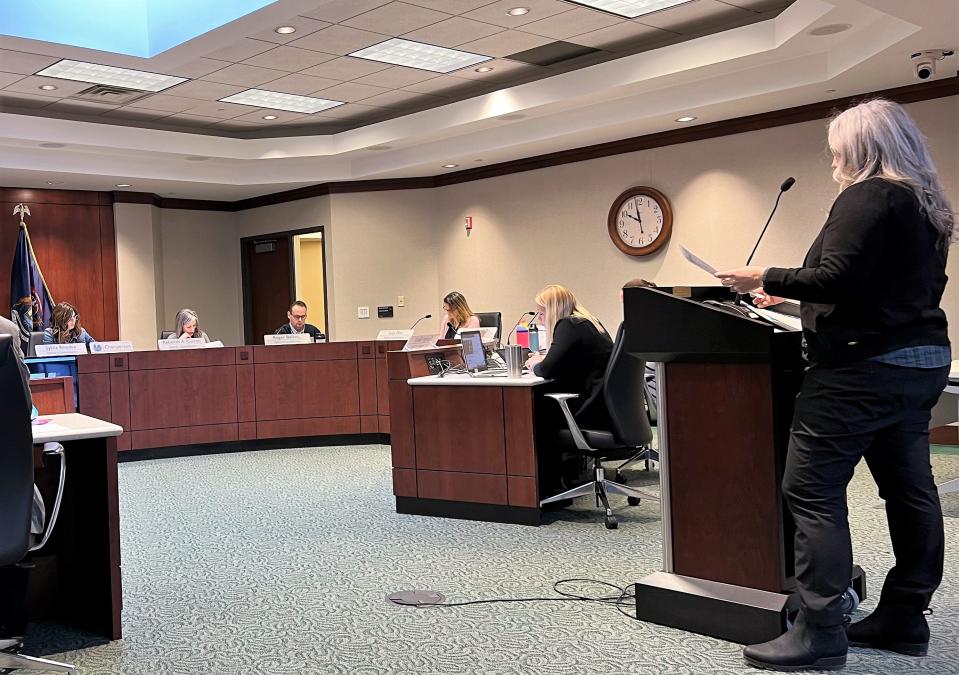
Vail said it’s frustrating when groups like Ottawa Impact don’t fully appreciate the purpose and mission of public health.
“There’s a lot to a health department,” she said. “And if you’ve never been in a health department, worked in a health department, then you don’t know anything about that. To say that you have a masters in public health and you worked as a health and safety manager, which essentially is OSHA — making sure employees are safe in a particular workplace is not public health.”
Everything we know about Nathaniel Kelly, the man Ottawa County’s board picked to lead its health department:
•Works at HVAC company in GR
•Has masters degree from online college in Alabama
•Spoke out against masks, social distancing during pandemichttps://t.co/22qTvqcIkK— Luke Stier (@LukeStier) January 5, 2023
Vail attributes a lot of the scrutiny health officers received during the pandemic to misinformation perpetuated on social media, rather than relying on historically trusted sources of information.
“Social media causes people who are reasonably intelligent to believe that ‘I can just search for this information and make a determination by myself.’ Well, unfortunately, I went to school for a lot of years in virology and immunology and I don’t think you can listen to a YouTube video or Google a few things and come up with the level of experience that 40 years has given me, working in these areas,” she said.
“I’m not going to tell an engineer how to build a bridge. I’m not going to Google this and say, ‘Step aside, I know a better way to do it.’ ... If I want to drive over that bridge, I want an engineer to design it and build it. I don’t know why we would look at public health as any less of a profession — and a profession that requires a very technical knowledge.”
Vail announced in August her plan to retire in February after a 16-year tenure. She has concerns that local governing boards will try to meddle with a position that needs to be above politics — and that the state’s qualification requirements for health officers should be followed.
“When you have been in this job for as long as I have and you’ve made decisions about ebola and West Nile virus and Eastern Equine Encephalitis and PFAS and oil spills in the Kalamazoo River … just because you know how to do air filtration optimization and all that sort of stuff in a place of business doesn’t mean you know how to handle an oil spill or PFAS or any number of other things.
“How do we deal with other significant public health issues — like gun violence is a public health issue, racism is a public health issue, the opioid crisis is an epidemic and a public health issue.
“What in your HVAC experience is going to help you with all of that?”
Can the board replace Hambley with Kelly?
That remains unclear.
Ottawa Impact commissioners believe the board had the authority to remove Stefanovski in 2021 after she issued the pre-K-6 mask order.
In dueling arguments during the course of litigation, former county corporate counsel Doug Van Essen said the Michigan Public Health Code did not allow for the board to reverse an order issued by the health officer, and that the county couldn’t fire the officer for issuing such an order.
In fact, Van Essen opined in an August 2021 statement that the health officer could be held civilly and criminally liable if she had withdrawn her mask mandate because of political pressure.
Both Van Essen and former state attorney general Mike Cox, in a parallel legal opinion issued in September 2021, said the board could only remove the health officer if she was “incompetent to execute properly the duties of the office” or if she was “guilty of official misconduct or habitual or willful neglect of duty,” but that the board could only pursue the latter two reasons after a hearing where the health officer and her legal counsel could be heard.
Now, at least one tenured commissioner has said he doesn’t think the board has the authority to remove Hambley — mask order or no mask order.
“I do not believe that the board has the authority or motive to remove Ms. Hambley from her position as health officer, nor do I believe we had the authority, or motive, to remove Ms. Stefanovski in 2021, when you had wanted us to do exactly that,” Commissioner Doug Zylstra wrote in a Feb. 1 email exchange with a constituent.
Zylstra also has voiced his concerns at the board’s public meetings.
“I do not question the fact that a majority makes the decision,” Zylstra wrote, referencing that he was in the minority in the vote to appoint Kelly to replace Hambley. “However, that does not mean that I will always agree with that decision, not be disappointed by it, or, in the case of Ms. Hambley, believe that that action was in accordance with state law.”
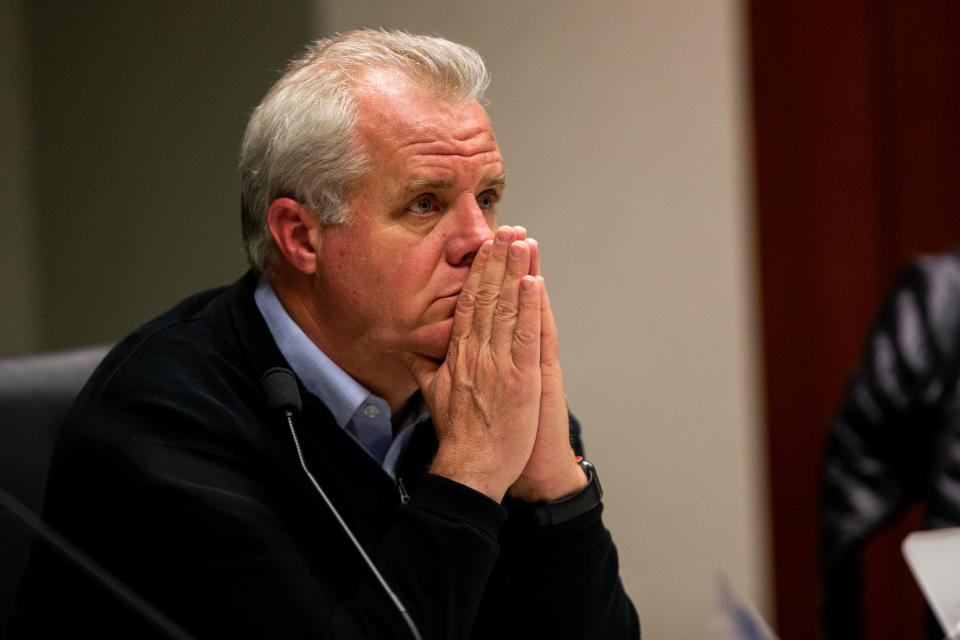
Meanwhile, the Ottawa Impact commissioners argue that, if they have the authority to appoint an officer, they have the authority to un-appoint one.
It’s unclear how the state will handle the request to appoint Kelly while a sitting health officer is still in place in Ottawa. The move is unprecedented, as governing agencies have historically filled vacant positions or worked with an exiting officer while hiring a new one.
A spokesperson with MDHHS said the department could not comment on the matter. As of Friday morning, Feb. 3, the state had not received any request from the county to appoint Kelly.
“This is a topic of a lot of litigation across the country,” Chrysler said. “There were health officers during COVID who refused to be overruled by their boards of commissioners because they looked at what their responsibilities were and they used their professional judgment and there were probably three or four health officers that were forced out. I don’t know if they were involved in litigation, but there were attorneys involved and settlements.”
Vail said she was lucky to have a board of commissioners who understood the challenge that health officials across the state and country faced during the pandemic.
“I was fortunate that I have a board of commissioners that supported me,” she said. “Because if I'm going to be asked to do something I don't think is the right thing to do? I’m not going to do it. … I was not going to compromise my principles as a professional to do something that I knew was not going to be the right thing to do.”
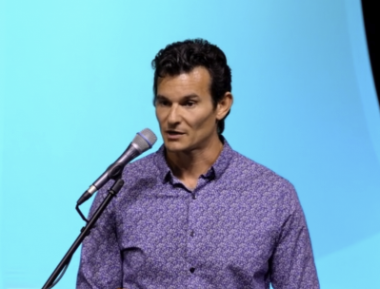
What’s at stake?
Hambley informed the Health and Human Services Committee on Tuesday the state had restarted its local health department accreditation program after it was paused during the pandemic.
“The public health code gives broad authority to MDHHS to assign a primary responsibility to the delivery of these services — and we have to meet those requirements,” she said.
One requirement is a plan of organization, a document that comes through the committee first, then must be approved by the full board. That plan includes who the health officer is and how the department plans to deliver its myriad services over the next three years.
More:Newly obtained texts show Ottawa Impact officials orchestrated law firm change before taking office
More:Residents angered over Ottawa Impact policies form coalition to vote them out in 2024
Hambley said the plan would need to be approved and sent to the state at least 60 days prior to a planned July inspection, meaning the organizational plan would need to be locally reviewed and approved sometime in April.
That could prove problematic if the matter of who the health officer is and any additional planned organizational changes have yet to be put into action.
Chrysler said the state has the authority to take over control of the local health department if necessary, as it has an obligation to Michigan residents to ensure services are delivered appropriately. That could mean combining Ottawa’s department with a neighboring county, such as Kent, or taking over delivery of services directly.
Subscribe:Get all your breaking news and unlimited access to our local coverage
Lynn Sutfin, a spokesperson from MDHHS, said Friday public health code does authorize MDHHS to step in under certain circumstances.
"This has happened in limited instances in the past," she said. "These actions have been to add to local health department capacity and to support the ongoing provision of services."
She said examples include the partnering with neighboring health departments to provide additional staffing during a staffing shortage or the creation of a state-level contact tracing team to augment local staff efforts during the COVID-19 pandemic.
“The state provides leadership and they oversee our whole system — a comprehensive system to protect everybody across the state and the state does have things they can do,” Chrysler said. “The state has a lot of leverage and ultimately it will come down to what the state chooses to do.”
Waggoner said one of the purposes of the accreditation process is to make sure there’s a plan of action, should a health crisis arise.
“That’s why you have such broad language in the public health code. There’s really broad discretion and it's intended to be flexible — to respond to any number of public health issues that may come up. That’s by design,” she said.
Ottawa Impact commissioners have not publicly addressed how they would tackle the possibility of Kelly being rejected by the state. Neither the OI-backed commissioners nor Kelly have ever responded to requests for comment.
— Sarah Leach is the executive editor of The Holland Sentinel. Contact her at sarah.leach@hollandsentinel.com. Follow her on Twitter @SentinelLeach.
This article originally appeared on The Holland Sentinel: Ottawa County's prospective health officer has no experience. Here's why that could be a problem

